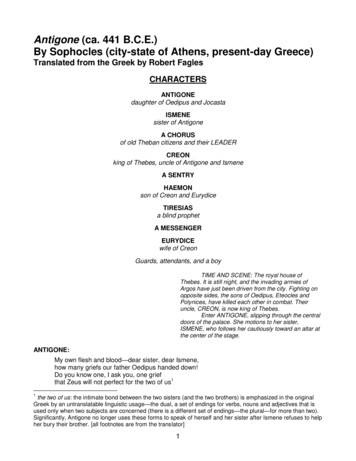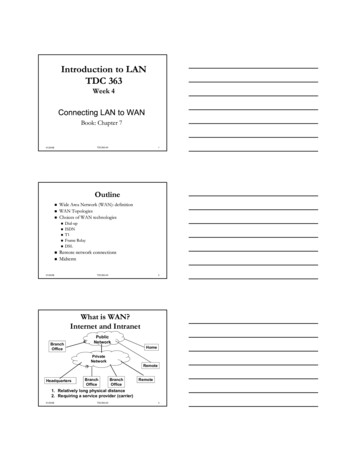
Transcription
Antigone (ca. 441 B.C.E.)By Sophocles (city-state of Athens, present-day Greece)Translated from the Greek by Robert FaglesCHARACTERSANTIGONEdaughter of Oedipus and JocastaISMENEsister of AntigoneA CHORUSof old Theban citizens and their LEADERCREONking of Thebes, uncle of Antigone and IsmeneA SENTRYHAEMONson of Creon and EurydiceTIRESIASa blind prophetA MESSENGEREURYDICEwife of CreonGuards, attendants, and a boyTIME AND SCENE: The royal house ofThebes. It is still night, and the invading armies ofArgos have just been driven from the city. Fighting onopposite sides, the sons of Oedipus, Eteocles andPolynices, have killed each other in combat. Theiruncle, CREON, is now king of Thebes.Enter ANTIGONE, slipping through the centraldoors of the palace. She motions to her sister,ISMENE, who follows her cautiously toward an altar atthe center of the stage.ANTIGONE:My own flesh and blood—dear sister, dear Ismene,how many griefs our father Oedipus handed down!Do you know one, I ask you, one griefthat Zeus will not perfect for the two of us11the two of us: the intimate bond between the two sisters (and the two brothers) is emphasized in the originalGreek by an untranslatable linguistic usage—the dual, a set of endings for verbs, nouns and adjectives that isused only when two subjects are concerned (there is a different set of endings—the plural—for more than two).Significantly, Antigone no longer uses these forms to speak of herself and her sister after Ismene refuses to helpher bury their brother. [all footnotes are from the translator]1
while we still live and breathe? There's nothing,no pain—our lives are pain2—no private shame,no public disgrace, nothing I haven't seenin your griefs and mine. And now this:an emergency decree, they say, the Commanderhas just now declared for all of Thebes.What, haven't you heard? Don't you see?The doom reserved for enemies3marches on the ones we love the most.510ISMENE:Not I, I haven't heard a word, Antigone.Nothing of loved ones,no joy or pain has come my way, not sincethe two of us were robbed of our two brothers,both gone in a day, a double blow—not since the armies of Argos vanished,just this very night. I know nothing more,whether our luck's improved or ruin's still to come.1520ANTIGONE:I thought so. That's why I brought you out here,past the gates, so you could hear in private.ISMENE:What's the matter? Trouble, clearly .you sound so dark, so grim.25ANTIGONE:Why not? Our own brothers' burial!Hasn't Creon graced one with all the rites,disgraced the other? Eteocles, they say,has been given full military honors,rightly so—Creon has laid him in the earthand he goes with glory down among the dead.But the body of Polynices, who died miserably—why, a city-wide proclamation, rumor has it,forbids anyone to bury him, even mourn him.He's to be left unwept, unburied, a lovely treasurefor birds that scan the field and feast to their heart's content.Such, I hear, is the martial law our good Creon23035our lives are pain: the translation here is dictated rather by the logic of the passage than the actual Greekwords. The phrase in Greek to which these words correspond is clearly corrupt (it seems to interrupt aculminating series of negatives with a positive), and no satisfactory emendation or explanation has ever beenoffered.3The doom reserved for enemies: this seems to refer to the fact that Creon had also exposed the corpses of theother six (non-Theban) attackers of the city; they are foreign "enemies," whereas Polynices, for Antigone, is stilla "friend," since he was a blood relative. The exposure of the other bodies was part of the legend as we find itelsewhere (in Euripides' play The Suppliants, for example) and is referred to in Tiresias' speech to Creon later inour play (1202-5). Some scholars interpret the Greek differently, to mean "evils planned by enemies," i.e., byCreon.2
lays down for you and me—yes, me, I tell you—and he's coming here to alert the uninformedin no uncertain terms,and he won't treat the matter lightly. Whoeverdisobeys in the least will die, his doom is sealed:stoning to death4 inside the city walls!There you have it. You'll soon show what you are,worth your breeding, Ismene, or a coward—for all your royal blood.4045ISMENE:My poor sister, if things have come to this,who am I to make or mend them, tell me,what good am I to you?ANTIGONE:Decide.Will you share the labor, share the work?50ISMENE:What work, what's the risk? What do you mean?ANTIGONE:Raising her hands.Will you lift up his body5 with these bare handsand lower it with me?ISMENE:What? You'd bury him—when a law forbids the city?ANTIGONE:Yes!He is my brother and—deny it as you will—your brother too.No one will ever convict me for a traitor.55ISMENE:So desperate, and Creon has expressly—ANTIGONE:No,4stoning to death: a penalty which involves the community in the execution; it is therefore particularly appropriate incases of treason, where the criminal has acted against the whole citizen body. It depends, of course, on thewillingness of the citizens to carry it out, and it is noticeable that though Creon later refuses to accept Haemon'sassertion that public opinion favors Antigone (776-82), he changes his mind about the penalty and substitutes onewhich does not require citizen participation.5Will you lift up his body . . . ? If she is to bury the body (and she speaks of "lifting" it), Antigone obviously needsIsmene's help; without it all she can do is perform a symbolic ritual—sprinkling the corpse with dust and pouringlibations.3
he has no right to keep me from my own.ISMENE:Oh my sister, think—think how our own father died, hated,his reputation in ruins, driven onby the crimes he brought to light himselfto gouge out his eyes with his own hands—then mother . his mother and wife, both in one,mutilating her life in the twisted noose—and last, our two brothers dead in a single day,both shedding their own blood, poor suffering boys,battling out their common destiny hand-to-hand.60Now look at the two of us, left so alone .think what a death we'll die, the worst of allif we violate the laws and overridethe fixed decree of the throne, its power—we must be sensible. Remember we are women,we're not born to contend with men. Then too,we're underlings, ruled by much stronger hands,so we must submit in this, and things still worse.70I, for one, I'll beg the dead to forgive me—I'm forced, I have no choice—I must obeythe ones who stand in power. Why rush to extremes?It's madness, madness.657580ANTIGONE:I won't insist,no, even if you should have a change of heart,I'd never welcome you in the labor, not with me.So, do as you like, whatever suits you best—I will bury him myself.And even if I die in the act, that death will be a glory.I will lie with the one I love and loved by him—an outrage sacred to the gods!6 I have longerto please the dead than please the living here:in the kingdom down below I'll lie forever.Do as you like, dishonor the lawsthe gods hold in honor.8590ISMENE:I'd do them no dishonor .but defy the city? I have no strength for that.ANTIGONE:You have your excuses. I am on my way,I will raise a mound for him, for my dear brother.695an outrage sacred to the gods: literally, "committing a holy crime." What is criminal in the eyes of Creon is holyin the eyes of the gods Antigone champions.4
ISMENE:Oh Antigone, you're so rash—I'm so afraid for you!ANTIGONE:Don't fear for me. Set your own life in order.ISMENE:Then don't, at least, blurt this out to anyone.Keep it a secret. I'll join you in that, I promise.ANTIGONE:Dear god, shout it from the rooftops. I'll hate youall the more for silence—tell the world!100ISMENE:So fiery—and it ought to chill your heart.ANTIGONE:I know I please where I must please the most.ISMENE:Yes, if you can, but you're in love with impossibility.ANTIGONE:Very well then, once my strength gives outI will be done at last.105ISMENE:You're wrong from the start,you're off on a hopeless quest.ANTIGONE:If you say so, you will make me hate you,and the hatred of the dead, by all rights,will haunt you night and day.But leave me to my own absurdity, leave meto suffer this—dreadful thing. I will suffernothing as great as death without glory.110Exit to the side.7ISMENE:7EXIT ANTIGONE. There is of course no stage direction in our text. We suggest that Antigone leaves the stagehere not only because after her speech she obviously has nothing more to say to Ismene, but also because theeffect of her harsh dismissal of her sister would be weakened if she then stood silent while Ismene had the lastword. We suggest that she starts out toward the side exit and Ismene speaks to her retreating figure before sheherself goes off stage, but through the door into the palace.5
Then go if you must, but rest assured,wild, irrational as you are, my sister,you are truly dear to the ones who love you.115Withdrawing to the palace.Enter a CHORUS, the old citizens of Thebes, chantingas the sun begins to rise.CHORUS:8Glory!—great beam of the sun, brightest of allthat ever rose on the seven gates of Thebes,you burn through night at last!Great eye of the golden day,mounting the Dirce's banks you throw him back—the enemy out of Argos, the white shield, the man of bronze—he's flying headlong nowthe bridle of fate stampeding him with pain!And he had driven against our borders,launched by the warring claims of Polynices—like an eagle screaming, winging havocover the land, wings of armorshielded white as snow,a huge army massing,crested helmets bristling for assault.He hovered above our roofs, his vast maw gapingclosing down around our seven gates,his spears thirsting for the killbut now he's gone, look,before he could glut his jaws with Theban bloodor the god of fire put our crown of towers to the torch.He grappled the Dragon none can master—Thebes—the clang of our arms like thunder at his back!Zeus hates with a vengeance all bravado,8120125130135140lines 117-179: The parados (literally, "the way past") is the name of the space between the end of the stage buildingand the end of the spectators' benches (see Introduction, pp. 19, 258). Through these two passageways the chorusmade its entrance, proceeding to the orchestra, the circular dancing-floor in front of the stage building. The wordparados is also used to denote the first choral song, the lines which the chorus chants as it marches in.This song is a victory ode, a celebration of the city's escape from capture, sack and destruction. The chorus imaginesthe enemy running in panic before the rising sun; their shields are white (122) perhaps because the name Argos suggeststhe adjective argos, which means "shining." The enemy assault of the previous day they compare to an eagle descendingon its prey, but it was met and routed by a dragon (138); the Thebans believed that they were descended from dragons'teeth, which, sown in the soil by Cadmus, their first king, turned into armored men. Of all the seven chieftains whoattacked the gates, Capaneus was the most violent and boastful; high on a scaling ladder he reached the top of the wallbut was struck down by a lightning bolt of Zeus (147). The defeat of the other attackers is the work of Ares (154), the wargod, who is also one of the patron deities of Thebes. The seven chieftains were all killed; all seven were stripped of theirarmor, which was then arranged on wooden frames in the likeness of a warrior. This is what the Greeks called a tropaion(our word "trophy"); the Greek word suggests "turning point," and in fact the trophy was set up at the point where thelosing side first turned and ran. The god who engineered such reversals was Zeus Tropaios—"god of the breaking rout ofbattle" (159). In the last stanza the dancers address Victory, who is always represented in Greek art as a winged femalefigure; they look forward to the joys of peace, the revelry associated with the god Dionysus, born of a Theban mother.6
the mighty boasts of men. He watched themcoming on in a rising flood, the prideof their golden armor ringing shrill—and brandishing his lightningblasted the fighter just at the goal,rushing to shout his triumph from our walls.Down from the heights he crashed, pounding down on the earth!And a moment ago, blazing torch in hand—mad for attack, ecstatiche breathed his rage, the stormof his fury hurling at our heads!But now his high hopes have laid him lowand down the enemy ranks the iron god of wardeals his rewards, his stunning blows—Aresrapture of battle, our right arm in the crisis.Seven captains marshaled at seven gatesseven against their equals, gavetheir brazen trophies up to Zeus,god of the breaking rout of battle,all but two: those blood brothers,one father, one mother—matched in rage,spears matched for the twin conquest--,clashed and won the common prize of death.But now for Victory! Glorious in the morning,joy in her eyes to meet our joyshe is winging down to Thebes,our fleets of chariots wheeling in her wake—Now let us win oblivion from the wars,thronging the temples of the godsin singing, dancing choirs through the night!Lord Dionysus, god of the dancethat shakes the land of Thebes, now lead the way!145150155160165170Enter CREON from the palace, attended by his guard.But look, the king of the realm is coming,Creon, the new man for the new day,whatever the gods are sending now .what new plan will he launch?Why this, this special session?Why this sudden call to the old mensummoned at one command?175CREON:My countrymen,the ship of state is safe. The gods who rocked her,after a long, merciless pounding in the storm,have righted her once more.Out of the whole cityI have called you here alone. Well I know,7180
first, your undeviating respectfor the throne and royal power of King Laius.Next, while Oedipus steered the land of Thebes,and even after he died, your loyalty was unshakable,you still stood by their children9. Now then,since the two sons are dead—two blows of fatein the same day, cut down by each other's hands,both killers, both brothers stained with blood—as I am next in kin to the dead,I now possess the throne and all its powers.Of course you cannot know a man completely,his character, his principles, sense of judgment,not till he's shown his colors, ruling the people,making laws. Experience, there's the test.As I see it, whoever assumes the task,the awesome task of setting the city's course,and refuses to adopt the soundest policiesbut fearing someone, keeps his lips locked tight,he's utterly worthless. So I rate him now,I always have. And whoever places a friendabove the good of his own country, he is nothing:I have no use for him. Zeus my witness,Zeus who sees all things, always—I could never stand by silent, watching destructionmarch against our city, putting safety to rout,nor could I ever make that man a friend of minewho menaces our country. Remember this:our country is our safety.Only while she voyages true on coursecan we establish friendships, truer than blood itself.10Such are my standards. They make our city great.Closely akin11 to them I have proclaimed,just now, the following decree to our peopleconcerning the two sons of Oedipus.Eteocles, who died fighting for Thebes,excelling all in arms: he shall be buried,crowned with a hero's honors, the cups we pourto soak the earth and reach the famous dead.But as for his blood brother, Polynices,who returned from exile, home to his father-cityand the gods of his race, consumed with one desire—to burn them roof to roots—who thirsted to drinkhis kinsmen's blood and sell the rest to slavery:that man—a proclamation has forbidden the city9185190195200205210215220225their children: i.e., the children of Oedipus and Jocasta.truer than blood itself: this is an attempt to bring out in English the double meaning of the word translated "friendships"; theGreek word philous means both "friends" and "close relations."11closely akin: the Greek word means literally "brother to." But Creon is in fact disregarding the claims of kinship.108
to dignify him with burial, mourn him at all.No, he must be left unburied, his corpsecarrion for the birds and dogs to tear,an obscenity for the citizens to behold!230These are my principles. Never at my handswill the traitor be honored above the patriot.But whoever proves his loyalty to the state—I'll prize that man in death as well as life.235LEADER:If this is your pleasure, Creon, treatingour city's enemy and our friend this way .The power is yours, I suppose, to enforce itwith the laws, both for the dead and all of us,the living.CREON:Follow my orders closely then,be on your guard.240LEADER:We are too old.Lay that burden on younger shoulders.CREON:No, no,I don't mean the body—I've posted guards already.LEADER:What commands for us then? What other service?CREON:See that you never side with those who break my orders.245LEADER:Never. Only a fool could be in love with death.CREON:Death is the price—you're right. But all too oftenthe mere hope of money has ruined many men.A SENTRY enters from the side.SENTRY:My lord,I can't say I'm winded from running, or set outwith any spring in my legs either—no sir,I was lost in thought, and it made me stop, often,dead in my tracks, wheeling, turning back,9250
and all the time a voice inside me muttering,"Idiot, why? You're going straight to your death."Then muttering, "Stopped again, poor fool?If somebody gets the news to Creon first,what's to save your neck?"And so,mulling it over, on I trudged, dragging my feet,you can make a short road take forever .but at last, look, common sense won out,I'm here, and I'm all yours,and even though I come empty-handedI'll tell my story just the same, becauseI've come with a good grip on one hope,what will come will come, whatever fate—-255260265CREON:Come to the point!What's wrong—why so afraid?SENTRY:First, myself, I've got to tell you,I didn't do it, didn't see who did—Be fair, don't take it out on me.270CREON:You're playing it safe, soldier,barricading yourself from any trouble.It's obvious, you've something strange to tell.SENTRY:Dangerous too, and danger makes you delayfor all you're worth.275CREON:Out with it—then dismiss!SENTRY:All right, here it comes. The body—someone's just buried it,12 then run off.sprinkled some dry dust on the flesh,given it proper rites.CREON:What?What man alive would dare—280SENTRY:12someone's just buried it: this is a token burial; it is defined in the lines that follow (289-92). The sprinkling of dust and thepouring of a libation were considered the equivalent of burial where nothing more could be done and so were a directdefiance of Creon's order.10
I've no idea, I swear it.There was no mark of a spade, no pickaxe there,no earth turned up, the ground packed hard and dry,unbroken, no tracks, no wheelruts, nothing,the workman left no trace. Just at sunupthe first watch of the day points it out—it was a wonder! We were stunned .a terrific burden too, for all of us, listen:you can't see the corpse, not that it's buried,really, just a light cover of road-dust on it,as if someone meant to lay the dead to restand keep from getting cursed.Not a sign in sight that dogs or wild beastshad worried the body, even torn the skin.But what came next! Rough talk flew thick and fast,guard grilling guard—we'd have come to blowsat last, nothing to stop it; each man for himselfand each the culprit, no one caught red-handed,all of us pleading ignorance, dodging the charges,ready to take up red-hot iron in our fists,go through fire,13 swear oaths to the gods—"I didn't do it, I had no hand in it either,not in the plotting, not the work itself!"Finally, after all this wrangling came to nothing,one man spoke out and made us stare at the ground,hanging our heads in fear. No way to counter him,no way to take his advice and come throughsafe and sound. Here's what he said:"Look, we've got to report the facts to Creon,we can't keep this hidden." Well, that won out,and the lot fell to me, condemned me,unlucky as ever, I got the prize. So here I am,against my will and yours too, well I know—no one wants the man who brings bad news.285290295300305310LEADER:My king,ever since he began I've been debating in my mind,could this possibly be the work of the gods?315CREON:Stop—before you make me choke with anger—the gods!You, you're senile, must you be insane?You say—why it's intolerable—say the godscould have the slightest concern for that corpse?Tell me, was it for meritorious service13320red-hot iron . . , go through fire: traditional (and hyperbolic) assertions of truthfulness; the reference is to some form of trial byordeal in which only the liar would get burned.11
they proceeded to bury him, prized him so? The herowho came to burn their temples ringed with pillars,their golden treasures—scorch their hallowed earthand fling their laws to the winds.Exactly when did you last see the godscelebrating traitors? Inconceivable!No, from the first there were certain citizenswho could hardly stand the spirit of my regime,grumbling against me in the dark, heads together,tossing wildly, never keeping their necks beneaththe yoke, loyally submitting to their king.These are the instigators, I'm convinced—they've perverted my own guard, bribed themto do their work.Money! Nothing worsein our lives, so current, rampant, so corrupting.Money—you demolish cities, root men from their homes,you train and twist good minds and set them onto the most atrocious schemes. No limit,you make them adept at every kind of outrage,every godless crime—money!Everyone—the whole crew bribed to commit this crime,they've made one thing sure at least:sooner or later they will pay the price.325330335340Wheeling on the SENTRY.You—I swear to Zeus as I still believe in Zeus,if you don't find the man who buried that corpse,the very man, and produce him before my eyes,simple death won't be enough for you,not till we string you up aliveand wring the immorality out of you.Then you can steal the rest of your days,better informed about where to make a killing.You'll have learned, at last, it doesn't payto itch for rewards from every hand that beckons.Filthy profits wreck most men, you'll see—they'll never save your life.SENTRY:Please,may I say a word or two, or just turn and go?CREON:Can't you tell? Everything you say offends me.SENTRY:Where does it hurt you, in the ears or in the heart?12345350355
CREON:And who are you to pinpoint my displeasure?360SENTRY:The culprit grates on your feelings,I just annoy your ears.CREON:Still talking?You talk too much! A born nuisance—SENTRY:Maybe so,but I never did this thing, so help me!CREON:Yes you did—what's more, you squandered your life for silver!365SENTRY:Oh it's terrible when the one who does the judgingjudges things all wrong.CREON:Well now,you just be clever about your judgments—if you fail to produce the criminals for me,you'll swear your dirty money brought you pain.370Turning sharply, reentering the palace.SENTRY:I hope he's found. Best thing by far.But caught or not, that's in the lap of fortune:I'll never come back, you've seen the last of me.I'm saved, even now, and I never thought,I never hoped—dear gods, I owe you all my thanks!375Rushing out.CHORUS:1414lines 376-416 The chorus entered the orchestra to the strains of the parados; it now, with the stage areaempty of actors,sings the first stasiman. The word means something like "stationary"; it distinguishes the songsthe chorus sings once it has reached the orchestra (where it will, normally, remain until the end of the play) fromthe parados, which it sings while marching in. But of course the chorus is not actually stationary; its membersdance in formation as they sing.This famous hymn to the inventiveness and creativeness of man has important thematic significance for theplay, in which a ruler, in the name of man's creation, the state, defies age-old laws: the ode ends with a warning13
Numberless wondersterrible wonders walk the world but none the match for man—that great wonder crossing the heaving gray sea,driven on by the blasts of winteron through breakers crashing left and right,holds his steady courseand the oldest of the gods he wears away—the Earth, the immortal, the inexhaustible—as his plows go back and forth, year in, year outwith the breed of stallions15 turning up the furrows.And the blithe, lightheaded race of birds he snares,the tribes of savage beasts, the life that swarms the depths—with one fling of his netswoven and coiled tight, he takes them all,man the skilled, the brilliant!He conquers all, taming with his techniquesthe prey that roams the cliffs and wild lairs,training the stallion, clamping the yoke acrosshis shaggy neck, and the tireless mountain bull.And speech and thought, quick as the windand the mood and mind for law that rules the city—all these he has taught himselfand shelter from the arrows of the frostwhen there's rough lodging under the cold clear skyand the shafts of lashing rain—ready, resourceful man!Never without resourcesnever an impasse as he marches on the future—only Death, from Death alone he will find no rescuebut from desperate plagues he has plotted his escapes.Man the master, ingenious past all measurepast all dreams, the skills within his grasp—he forges on, now to destructionnow again to greatness. When he weaves in16the laws of the land, and the justice of the godsthat binds his oaths togetherhe and his city rise high—380385390395400405410that man's energy and resourcefulness may lead him to destruction as well as greatness. But choral odes,though one of their important functions is to suggest and discuss the wider implications of the action, usuallyhave an immediate dramatic relevance as well. In this case the chorus must be thinking of the daring andingenuity of the person who gave Polynices' body symbolic burial. This does not mean that they are expressingapproval of the action; the wonders of the world, of which man is the foremost, are "terrible wonders."The ode's vision of human history as progress from helplessness to near mastery of the environmentreappears in other fifth-century dramatic texts, notably in the Prometheus Bound and the Euripidean Suppliants.It is likely that all these accounts are based on a book (now lost) by the sophist Protagoras called The State ofThings in the Beginning.15the breed of stallions: mules, then, as now, the work animal of a Greek farm.16weaves in: this is a literal translation of the reading found in all the manuscripts, pareiron. Though the word occurselsewhere in fifth-century tragedy, editors have thought the metaphor too violent here; most editors take it as acopyist's mistake for gerairon, which would give the meaning "honors," "reveres."14
but the city casts outthat man who weds himself to inhumanitythanks to reckless daring. Never share my hearthnever think my thoughts, whoever does such things.415Enter ANTIGONE from the side, accompanied by theSENTRY.Here is a dark sign from the gods —what to make of this? I know her,how can I deny it? That young girl's Antigone!Wretched, child of a wretched father,Oedipus. Look, is it possible?They bring you in like a prisoner —why? did you break the king's laws?Did they take you in some act of mad defiance?17420SENTRY:She's the one, she did it single-handed —we caught her burying the body. Where's Creon?425Enter CREON from the palace.LEADER:Back again, just in time when you need him.CREON:In time for what? What is it?SENTRY:My king,there's nothing you can swear you'll never do—second thoughts make liars of us all.I could have sworn I wouldn't hurry back(what with your threats, the buffeting I just took),but a stroke of luck beyond our wildest hopes,what a joy, there's nothing like it. So,back I've come, breaking my oath, who cares?I'm bringing in our prisoner—this young girl—we took her giving the dead the last rites.But no casting lots this time; this is my luck,my prize, no one else's.Now, my lord,here she is. Take her, question her,cross-examine her to your heart's content.But set me free, it's only right—I'm rid of this dreadful business once for all.17430435440act of mad defiance: the chorus here and later (677, "fury at the heart") can explain Antigone's defiance of poweronly as mental aberration; Creon speaks in similar terms of the two sisters when Ismene wishes to join her sister indeath ("They're both mad, I tell you . . . " 632).15
CREON:Prisoner! Her? You took her—where, doing what?SENTRY:Burying the man. That's the whole story.CREON:What?You mean what you say, you're telling me the truth?445SENTRY:She's the one. With my own eyes I saw herbury the body, just what you've forbidden.There. Is that plain and clear?CREON:What did you see? Did you catch her in the act?450SENTRY:Here's what happened. We went back to our post,those threats of yours breathing down our necks—we brushed the corpse clean of the dust that covered it,stripped it bare . it was slimy, going soft,and we took to high ground, backs to the windso the stink of him couldn't hit us;jostling, baiting each other to keep awake,shouting back and forth—no napping on the job,not this time. And so the hours dragged byuntil the sun stood dead above our heads,a huge white ball in the noon sky, beating,blazing down, and then it happened—suddenly, a whirlwind!Twisting a great dust-storm up from the earth,a black plague of the heavens, filling the plain,ripping the leaves off every tree in sight,choking the air and sky. We squinted hardand took our whipping from the gods.And after the storm passed—it seemed endless—there, we saw the girl!And she cried out a sharp, piercing cry,like a bird come back to an empty nest,peering into its bed, and all the babies gone .Just so, when she sees the corpse bareshe bursts into a long, shattering wailand calls down withering curses on the headsof all who did the work. And she scoops up dry dust,handfuls, quickly, and lifting a fine bronze urn,lifting it high and pouring, she crowns the dead16455460465470475 page
Sep 05, 2013 · a "friend," since he was a blood relative. The exposure of the other bodies was part of the legend as we find it elsewhere (in Euripides' play The Suppliants, for example) and is referred to in Tiresias' speech to Creon later in our play (1202-5). Some scholars interpret the Greek differe











